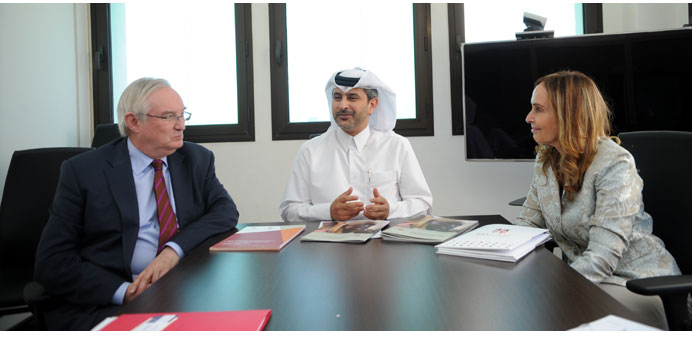Al-Naimi flanked by Burnett and Dr Pigozzi yesterday. PICTURE: Shemeer Rasheed.
By Bonnie James/Deputy News Editor
Governments, private sector companies, civil society organisations, and United Nations agencies will share a common platform today and tomorrow in Doha to accelerate efforts to reach out of school children, estimated to be more than 61mn.
The High Level Strategic Meeting (HLSM) is to be chaired by HH Sheikha Moza bint Nasser, who is the chairperson of Education Above All Foundation, UN Advocate for the second Millennium Development Goal on universal primary education, and Unesco Special Envoy for Basic and Higher Education.
The event is sponsored by Educate A Child (EAC), the global programme launched by HH Sheikha Moza on November 14, 2012 in Doha at the World Innovation Summit for Education.
EAC aims to assist the out of school primary learners to have an opportunity to participate in quality education, particularly in regions facing poverty and dealing with the consequences of conflict and natural disaster.
“Educate A Child is the most important of all the educational initiatives launched by HH Sheikha Moza under the umbrella of Education Above All Foundation (EAA) and the HLSM will take a 360 degree view of the scenario with the participation of all the stakeholders,” Mohamed Abdulaziz al-Naimi, executive committee member, EAA told Gulf Times yesterday.
Dr Mary Joy Pigozzi, director, EAC, explained that the research paper, ‘A Moral Obligation, An Economic Priority: The Urgency of Enrolling Out of School Children,’ to be presented today at the event, “brings to light some really new and critical information to enable people to understand the magnitude and the depth of the problem, the weight that it has on everybody if it is not resolved.”
The paper, commissioned by EAC, has been prepared by a team led by Dr Nicholas Burnett of the Washington-based Results for Development Institute.
“It summarises all the evidence about the benefits of education, and though most of those conclusions are already well known, it is important to emphasise that all the new evidence continues to support the previous conclusions about the importance of education, which in addition to being a human right, is also important in social, economic, health and environmental terms as well,” Burnett said.
The new analysis tries to estimate what would be the size of the economies in which there are still out of school children, if in fact those children were in school or had been in school.
“We find a range of estimates, for example, in Cote d’lvoire the current GDP is as much as 7% below what it would otherwise have been, had all the children had primary education and many had gone on to secondary education. This is pretty dramatic,” he maintained.
“The second way of estimating looks more for the impact upon the per capita income and again, shows a range according to the countries. But again it shows very dramatic increases that would be there if these children were educated. The most dramatic case is Mali where it would be over 80% higher per capita income,” Burnett revealed.
Dr Pigozzi said that a presentation by Unicef and Unesco will look at some tools that have been developed to identify and address out of school children, with a special emphasis on the obstacles. The session titled ‘Partners’ Market Place for Ideas’ will give concrete examples of how people are really addressing these problems.
“HH Sheikha Moza is very forward looking, she acknowledges the challenge, that is why she took on the Global Advocate position. Her mission is to really change the numbers and to go forward by analysing what do we know now, what can we change, how can we change it, how can we work together, and how can we bring all the resources together,” she said.
Asked about a timeline, Dr Pigozzi revealed that in the short run EAC is looking at the next five years, and beyond that another five. A very large monitoring and evaluation system is to be put in place by December this year.
Al-Naimi described the entire process as a journey. “All the partners are working collectively, step by step. We were in Paris last November, and a few days ago the team was in Washington, talking about how to address this important topic, and now in Doha all are trying to address the core issue of the subject,” he said.
Some of the 17 countries attending the conference are for the first time in a meeting with private sector agencies and the UN, the official added while expressing hopes that the HLSM will be a success.

